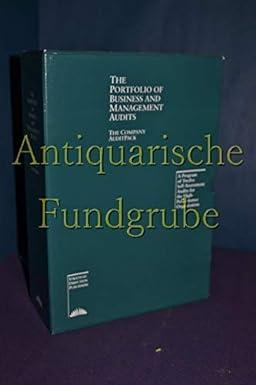Answered step by step
Verified Expert Solution
Question
1 Approved Answer
Fifteen years ago, husband and wife Stuart and Marsha Widell organized Widell Engineering Associates (WEA), a Delaware corporation that builds, repairs, and manages waste treatment
Fifteen years ago, husband and wife Stuart and Marsha Widell organized Widell Engineering Associates (WEA), a Delaware corporation that builds, repairs, and manages waste treatment plants throughout the Southwest. The Widells capitalized WEA with cash of $500,000 and industrial equipment having an adjusted basis of $4.5 million, each in exchange for 2,500 shares of WEA common stock. Three years later, Stuart and Marsha each gifted 500 shares of their WEA stock to their son Weymouth. As a result of a sharp upswing in the economy, WEAs profits swelled under the joint management of Stuart and Weymouth. After ten years of joint control, however, and be-cause of irreconcilable differences with his father, Weymouth decided to leave WEA and organize his own engineering firm, Fortunelle. To keep WEAs business in the family and to give Stuart complete WEA manage-ment control, Stuart, Marsha, and Weymouth agreed that WEA would redeem all of Weymouths 1,000 shares with waste treatment property worth $8.5 million. To ensure capital gains treatment, Weymouth obtained a waiver of the family attribution rules in re-turn for an agreement with the IRS not to acquire an equity interest in WEA for ten years and to notify the IRS if he does so. Following the redemption, Weymouth transferred the property to Fortunelle in exchange for all 8,500 shares of Fortunelle common stock. Last year, Stuart suffered a heart attack. He now has proceeded to reconcile his difference with Weymouth. To retain Widell family control of WEAs business, Stuart, Marsha, and Weymouth propose that WEA and Fortunelle conclude an arms length agreement under which Fortunelle would manage WEAs waste treatment plants in return annually for 20% of WEAs gross rental revenues, but no equity interest. The Widells are convinced that the proposed arrangement does not violate either the Sec. 302 waiver rules or Weymouths agreement with the IRS. They have asked you to draft a letter (using the tax research template) that confirms this understanding. In researching the issue, consult at a minimum the following authorities: IRC Sec. 302(c)(2) Rev. Rul. 70-104, 1970 C.B. 66 Chertkof v. Commissioner, 48 AFTR 2d 81-5194, 81-1 USTC 9462 (4th Cir, 1981
Step by Step Solution
There are 3 Steps involved in it
Step: 1

Get Instant Access to Expert-Tailored Solutions
See step-by-step solutions with expert insights and AI powered tools for academic success
Step: 2

Step: 3

Ace Your Homework with AI
Get the answers you need in no time with our AI-driven, step-by-step assistance
Get Started


